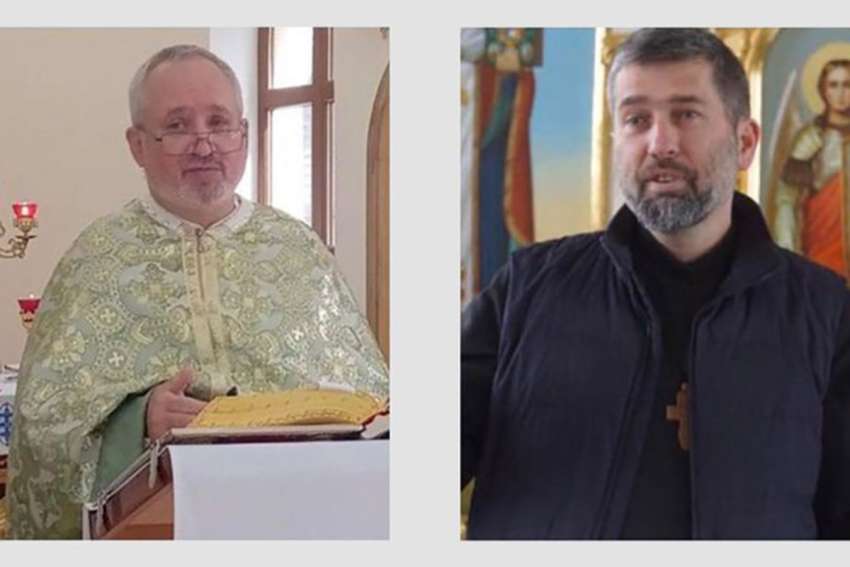Fr. Ivan Levitsky and Fr. Bohdan Geleta, both Redemptorist priests, were seized in November 2022 from the Church of the Nativity of the Most Holy Theotokos in Berdiansk in Ukraine’s Zaporizhzhia Oblast.
Ultimately, “the Russians don’t explain what they’re doing, what plans they have, what their intentions are in seizing people,” said Forum 18 researcher Felix Corley.
Both priests had refused to leave their parishioners following the Russian invasion in February 2022, which continued attacks launched in 2014 against Ukraine.
Russian media reported the priests had been detained for “subversive” and “partisan” activities against Russian forces, who claimed to have discovered explosives, weapons and “prohibited literature” in the church. According to Russian media, the two Redemptorists had rallied area residents to resist Russian forces, and had organized prayer services in support of Ukraine.
The Ukrainian Greek Catholic Church’s Archiepiscopal Exarchate of Donetsk said the arrests were in retaliation for the Ukrainian government’s search of the Pechersk Lavra, a Kyiv monastery also known as the Monastery of the Caves, which is under the authority of the Ukrainian Orthodox Church, Moscow Patriarchate.
Shortly after the priests were captured, Major Archbishop Sviatoslav Shevchuk, head of the Ukrainian Greek Catholic Church, said he had received “the sad news that our priests are being tortured without mercy.”
In May, Corley asked the occupation police in Berdiansk about the Redemptorist priests’ location and welfare. In response, he was told “that’s all rubbish,” and to instead ask “(Ukrainian President Volodymyr) Zelenskyy’s special services — they’re responsible.” The police officer, who provided no evidence for his claim, then hung up.
Corley also approached Artyom Sharlay, head of the Russian occupation’s Religious Organizations Department in the Zaporizhzhia region, for information on the two priests. In October, Sharlay insisted to Corley that “no one is kidnapped here,” instead claiming, without evidence, that the priests had stored weapons in their church and that “if they committed a crime they had to be arrested.”
Sharlay also said the two priests will face trial “as soon as new (Russian-controlled) courts are established here.” However, a duty officer at the Russian Investigative Committee for the Zaporizhzhia region told Corley it had no criminal case against the priests and no information about them. Sharlay denounced in particular the Ukrainian Greek Catholic Church, which he said “has never been traditional in this area” and “represents an expansion of Western culture.”
Writing on the Forum 18 website, Corley noted that “Sharlay did not explain why these claims justify human rights violations.”
Corley has also reported on other missing religious leaders, including Ukrainian Orthodox Church priest Fr. Kostiantyn Maksimov, who was in Tokmak and was detained while trying to cross into Crimea in May. That same month, fellow Ukrainian Orthodox priest Fr. Ihor Novosilsky, from the Kherson region, was released after being captured in August 2022 and tortured. Imam Rustem Asanov, a Crimean Tartar from a Kherson-region mosque, is known to have been tortured as well by Russian forces.
Baptist pastor Leonid Ponomaryov and his wife, Tatyana, were held by Russian forces from September to October 2022. The following month, 52-year-old Pentecostal deacon Anatoly Prokopchuk and his 19-year-old son Aleksandr were captured, tortured and shot to death.
Corley told OSV News that Russian occupation officials “don’t seem to be particularly” surprised to hear from him, “but they’re very resistant to … giving any information.” He said he has been unable to reach Sharlay since that “extensive conversation,” which lasted “three quarters of an hour.”
“He’s just not answered,” said Corley. “So maybe he realizes, you know, it’s either not worth it or he doesn’t want to, or he got into trouble. I don’t know.”
Having walked away from multiple international agreements, Russia has made it “quite clear” that its government “does not have much respect for international human rights commitments, and is not shy about showing that to the world,” said Corley.
Even within Russia itself, “It’s become ever more difficult for people … to exercise freedom of religion and belief,” said Corley. “There’s a lot of state control over all aspects of life, and independent organizations of any sort are under pressure, whether they’re independent trade unions, the media, political parties (and) especially religious organizations, social organizations.”
The Catholic Church in Russia, which represents only a tiny segment of the population, “has really tried to just stay out of any kind of political trouble,” he said. “They just try to be so careful and not stick their necks out.”
Over the last five to 10 years, said Corley, Russia “has taken a definite turn for the worse in violating international commitments on freedom of religion or belief for all.”


